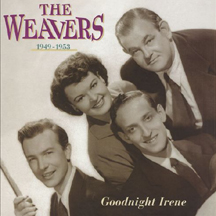The Weavers were an American folk music quartet based in the Greenwich Village area of New York City. They sang traditional folk songs from around the world, as well as blues, gospel music, children's songs, labor songs, and American ballads, and sold millions of records at the height of their popularity. Their hard-driving string-band style inspired the commercial "folk boom" that followed them in the 1950s and 1960s, including such performers as The Kingston Trio, Peter, Paul, and Mary, The Rooftop Singers, and Bob Dylan. (More from Wikipedia)
In 1983, Holly Near teamed up with Ronnie Gilbert, formerly with the legendary folk group the Weavers, for the first of several albums. The duo also collaborated with another former Weaver, Pete Seeger plus Arlo Guthrie in a group called HARP, named after the initials in their first names.
(January 2014)
* * *
And Joan Baez was there beginning in 1960 when the folk music revival was in its heyday; and she wasn't political at all in the beginning. Folk music has always been fairly gender-balanced – besides Joan, Judy Collins and Joni Mitchell were leading lights who went on to have long careers. The folk groups often had at least one woman – there was Mary Travers in Peter, Paul and Mary, and Ronnie Gilbert in the Weavers.
Following her performance at the 1959 Newport Folk Festival, Joan Baez recorded her first album for Vanguard Records, Joan Baez, which was produced by Fred Hellerman of the Weavers. While not a big seller right away, it has been certified "gold", as were Joan Baez, Vol. 2 and Joan Baez in Concert. Her early studio albums were mostly collections of traditional folk ballads and blues songs sung in her lovely soprano voice. However, Joan's early concert albums were unusual in that they included new songs rather than traditional material or established songs.
(February 2014)
* * *
John A. Lomax and Alan Lomax promoted Lead Belly as an authentic American folksinger, and two of his songs rank high in the folk pantheon: "Goodnight Irene" was a big hit in 1950 for the early folksinging group the Weavers (whose members included Pete Seeger), and the country-blues song "Midnight Special" became the name and also the theme song of a popular musical variety program, The Midnight Special which ran from 1972 to 1981. The latter song was attributed by the Lomaxes to Lead Belly (that was the way that Huddie Ledbetter himself used the nickname); though the song is actually much older, Lead Belly apparently supplied several verses of his own to the song. The reference is to a late-night train that would lift the spirits of men in prison as it rolled past.
(February 2015)
* * *
The best known song on the Woody Guthrie album Dust Bowl Ballads is "So Long, It's Been Good to Know Yuh" (called "Dusty Old Dust" on the album). The Weavers had a hit with "So Long (It's Been Good to Know Yuh)" in 1951, taking it to #4 on the pop music charts and becoming one of their "staple" songs. From Wikipedia: "The repetitive chorus has been described as 'a witty, black retort, utterly negative and apocalyptic'".
* * *















